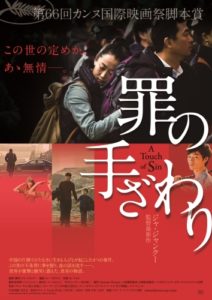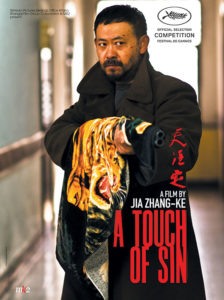A Touch of Sin
天注定
China/Japan, 2013, colour, 2.35:1, 133 mins.
Director: Jia Zhangke 贾樟柯.
Rating: 5/10.
Tetraptych of people driven to violence looks great but is thin on content and psychology.
China, the present day. Former miner Dahai (Jiang Wu) returns to Black Gold Mountain, Shanxi province, and confronts the village chief over profiting personally from the sell-off the state-owned mine and breaking his promise to the workers that they would all share the proceeds. Dahai tries to send a letter to the Discipline Commission in Beijing, exposing the corruption but is unsuccessful. When new mine boss Jiao Shengli arrives by private plane from Hong Kong, Dahai confronts him at the airport, and Jiao Shengli has him savagely beaten up. After visiting his elder sister, Dahai decides to take matters into his own hands. Over Chinese New Year, migrant  worker Zhou San (Wang Baoqiang), who is fascinated by guns and shot three muggers in Shanxi, visits his wife and young son in Shapingba, a district of Chongqing. His elder brother gives him his share of the leftover money from their mother’s 70th birthday celebrations. He says he doesn’t want it – and, after hitting the road again, collects money in other ways. Further down the Yangtze River, in Yichang, Hubei province, sauna receptionist Zheng Xiaoyu (Zhao Tao) sees off her married lover, Zhang Youliang (Zhang Jiayi), at the train station. He’s going to Guangzhou to manage a factory, and gives her six months to decide whether to join him or not. Back at work, she’s beaten up by Zhang Youliang’s angry wife one evening. After visiting her mother out of town, Zheng Xiaoyu returns to the sauna, where she encounters two bullying customers. In Guangdong province, at the factory managed by Zhang Youliang, young employee Xiaohui (Luo Lanshan) is ordered to compensate a fellow employee for an accidental injury caused by them chatting during work. Xiaohui runs off to Dongguan, where he gets a job in a luxury hotel catering for Hong Kong and Taiwan sex tourists. There he meets the feisty Lianrong (Li Meng), also originally from Hubei province, but circumstances force them apart.
worker Zhou San (Wang Baoqiang), who is fascinated by guns and shot three muggers in Shanxi, visits his wife and young son in Shapingba, a district of Chongqing. His elder brother gives him his share of the leftover money from their mother’s 70th birthday celebrations. He says he doesn’t want it – and, after hitting the road again, collects money in other ways. Further down the Yangtze River, in Yichang, Hubei province, sauna receptionist Zheng Xiaoyu (Zhao Tao) sees off her married lover, Zhang Youliang (Zhang Jiayi), at the train station. He’s going to Guangzhou to manage a factory, and gives her six months to decide whether to join him or not. Back at work, she’s beaten up by Zhang Youliang’s angry wife one evening. After visiting her mother out of town, Zheng Xiaoyu returns to the sauna, where she encounters two bullying customers. In Guangdong province, at the factory managed by Zhang Youliang, young employee Xiaohui (Luo Lanshan) is ordered to compensate a fellow employee for an accidental injury caused by them chatting during work. Xiaohui runs off to Dongguan, where he gets a job in a luxury hotel catering for Hong Kong and Taiwan sex tourists. There he meets the feisty Lianrong (Li Meng), also originally from Hubei province, but circumstances force them apart.
REVIEW
Writer-director Jia Zhangke 贾樟柯 has described his seventh feature, A Touch of Sin 天注定, as “a wuxia pian 武侠片 [costume martial-arts film] about contemporary China”. Alas for him, apart from the English title’s pun on the classic swordplay movie A Touch of Zen 侠女 by Hu Jinquan 胡金铨 [King Hu], the staging of two brief sequences (the opening holdup and a sauna dagger fight), and occasional opera music on the soundtrack, the film has nothing in common with the works of either Hu or Zhang Che 张彻 (two of Jia’s heroes), nor any of the spirit, look or flavour of martial-arts movies. Instead, Jia’s first fictional feature in five years is simply a collection of four anecdotes – unrelated but all inspired by real-life events – on the common theme of people pushed over the edge into acts of violence, by anger at personal or social injustices.
It’s a valid theme in modern-day China, where there’s much discussion of the breakdown in the old social consensus as the country rapidly develops and the gap between rich and poor widens. But as a subject, it’s nothing new in Mainland cinema and has been examined far more trenchantly than here. Most of Jia’s films have been essentially episodic, with little grasp of long dramatic lines, and, despite small overlaps which elide one story into another, Sin is essentially an anthology movie, with four (untitled) episodes of about 35 minutes each. Each has a slightly different look and feel, reflecting the separate locations (Shanxi, Chongqing, Hubei, Guangdong), but all are marked by Jia’s habit of moving characters around at his own convenience and a complete disregard for sharing any of their psychology with the audience.
The strongest is the opening story, in Jia’s native province of Shanxi where his early films were also set – a well-constructed vignette about a miner who takes bloody revenge on a corrupt village chief and local businessman for personally profiting from the sell-off of state assets. Blackly comic throughout, with a wonderfully gruff performance by Jiang Wu 姜武 (Shower 洗澡, 1999; The Robbers 我的唐朝兄弟, 2009) as the blockheaded angel of vengeance, it’s closer to a mini-spaghetti western, especially in its staging and framing of the massacres, and, though the characterisation is obviously black-and-white, does at least make an attempt to explain the main character’s actions. Like Jiang, goofy actor Wang Baoqiang (Mr Tree Hello!树先生, 2011; Lost in Thailand 人再囧途之泰囧, 2012) is the best thing in the second episode, a rather pointless tale about a migrant worker in love with guns who visits his wife over New Year. But unlike the first epsiode, there’s no real insight here into the mind of the offhand killer.
Jia’s regular actress-muse Zhao Tao 赵涛 dominates the third story, centred on a receptionist at a sauna who takes bloody revenge on some violent clients. She’s as blank a slate as in her five other features for Jia, who again simply wheels her on and off screen and relies on her iconic looks and presence rather than any true character building. Zhao herself (apparently intended to evoke A Touch of Zen actress Xu Feng 徐枫 in her hair and clothing) seems cold and inpenetrable opposite the fine Zhang Jiayi 张嘉译 (One Night in Supermarket 夜•店, 2009; Love Is Not Blind 失恋33天, 2011) as her businessman lover.
The movie recovers slightly in its fourth episode, about two Hunan youngsters (nicely played by Luo Lanshan 罗蓝山 and the feisty Li Meng 李梦) who meet in Guangdong province’s sex-industry town, Dongguan, but doesn’t create a convincing enough sense of desperation to justify the main character’s final action. Echoes of Jia’s usual visual style and handling of actors (especially in Unknown Pleasures 任逍遥, 2002, and The World 世界, 2004) are even stronger here than in the previous episode, especially in the young couple’s relationship. But the segment is more interesting for its ironic portrait of Dongguan’s sex industry, already explored in some depth in films like the drama Sauna on Moon 嫦娥 (2011) and Hong Kong erotic comedy Due West: Our Sex Journey 一路向西 (2012).
For a movie running two-and-a-quarter hours, the above is pretty thin gruel in terms of content, and wouldn’t be half as digestible were it not for the stunning widescreen photography by Hong Kong d.p. Yu Liwei 余力为, who gives each location its own flavour within a common overall aesthetic. From the rough mountainous landscapes of wintry Shanxi to the warmer-hued climes of Guangdong in the south, Yu’s camera is the star of the show. Take that component out of A Touch of Sin and nothing especially original, involving or (least of all) trenchant is left.
The Chinese title roughly means “Destiny” or “Heaven Decides”, either of which is preferable to the current, unworthy English pun.
CREDITS
Produced by Xstream Pictures (Beijing) (CN), Office Kitano (JP), Shanghai Film Group (CN).
Script: Jia Zhangke. Photography: Yu Liwei. Editing: Matthieu Laclau, Lin Xudong. Music: Lin Qiang [Lim Giong]. Production design: Liu Weixin. Art direction: Li Jun. Styling: Wang Tao. Sound: Si Zonglin, Zhang Yang. Visual effects: Base FX.
Cast: Jiang Wu (Dahai), Wang Baoqiang (Zhou San), Zhao Tao (Zheng Xiaoyu), Luo Lanshan (Xiaohui), Zhang Jiayi (Zhang Youliang, Zheng Xiaoyu’s lover), Li Meng (Lianrong), Liu Lu, Han Dong, Wang Hongwei, Wang Qiang.
Premiere: Cannes Film Festival (Competition), 17 May 2013.
Release: China, tba; Japan, 31 May 2014.
(Review originally published on Film Business Asia, 18 May 2013.)
